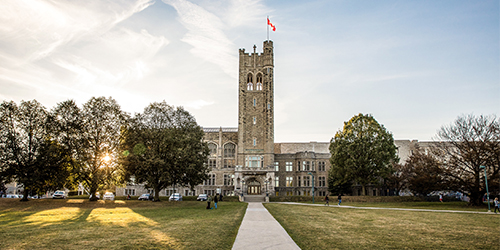Parents | Family
 Some students begin their first year of university with definite career ideas and a plan to get there, while others may be uncertain about their future. Though frequently, students' plans will change, actually, on average about 2.25 times! Planning for the future can be very difficult and we know that parents often play a critical role.
Some students begin their first year of university with definite career ideas and a plan to get there, while others may be uncertain about their future. Though frequently, students' plans will change, actually, on average about 2.25 times! Planning for the future can be very difficult and we know that parents often play a critical role.
![]() 85% of jobs that will exist in 2030 have not yet been created - or even invented.
85% of jobs that will exist in 2030 have not yet been created - or even invented.
The world of work is quite different than it was 30, 20, or even 10 years ago. What might have been sound advice when you yourself first entered the job market, may no longer apply.
How to Enhance Career Conversations with Your Student
Show Support
Education today is very expensive and parents who pay the bills may be hoping to see a return on their investment. However, finding career success in today's global economy requires much more than a decision solely motivated by parental pressure. When speaking with your student, encourage them to pursue work that allows them to work on challenges or problems they find meaningful. Larry Smith, an instructor of economics at the University of Waterloo explains that: “Once, you needed to show no particular interest in your work, only a willingness to work hard for your pay. Now, you must show genuine interest in your work. Tomorrow, you will have to demonstrate passion.” Consequently, it is more important to support your student in their career interests and decisions. Remember, a happy history student may have an easier time finding work than a disgruntled business student.
Be Informed
Arm yourself with career-relevant information - with more than 2 million job titles in Canada, it is likely that your student has overlooked a pertinent career. Only 20% of the occupations in this country are regulated (e.g. Doctor, Lawyer, Engineer), which means the majority of jobs today do not have specific entry requirements. While opportunities may require certain educational backgrounds or additional specialized training, more often than not, a student’s specific academic discipline is the least important thing that employers are looking for. Today, “employability” means having marketable skills that businesses want, being able to communicate those skills can be transferred to novel experiences, and how to carry them from job-to-job as labour market demands shift.
Start Early
It’s never too early for your student to be thinking about their future. Many first-year students are dealing with adjustment and transition concerns, along with other academic demands; the thought of career planning may seem fairly remote at this stage. However, there are many steps your student can take early on to prepare themselves for their future career. Encourage them to seek out extracurricular & volunteer activities in year one, to learn about experiential learning opportunities, and to start thinking about summer jobs. These experiences will help them develop important skills and learn more about the world of work. Often the best summer job opportunities are posted in the fall. Students who are thinking early about their career, by integrating valuable summer work and other activities, will be ahead of the game.
Encourage Balance
All work and no fun makes for an unhappy student. While it's important to prioritize academic responsibilities, in terms of preparing for the workforce, it is equally important to get involved with campus and community activities. Employers inform us that grades are not always what will help a student find work (and most never even ask to see a transcript!) In fact, verbal communication skills, analytical skills, a strong work ethic, and teamwork skills are cited as the most important candidate qualities by employers across Canada.
Consider Internships, Co-Ops & Other Experiential Learning Opportunities
Western offers a multitude of opportunities for internships, co-ops, or other experiential learning opportunities. These experiences can help provide direction and incentive to your student; it is an excellent way to learn about the job market, acquire hands-on experience, and test out new skills and interests. These opportunities allow students to better assess whether they are heading in the right direction and could positively impact future career success. Students are often hired upon graduation by the company with which they completed their internship.
Understand the Value of Activities Outside the Classroom
Encourage your student to get involved in activities outside of the academic bubble. Students can master the art of networking and socializing through interactions with friends and people they will inevitably meet while getting involved within the community. Although students spend plenty of hours in class, it is often what they do outside of class that really sticks with them. These outside-of-class activities lead to improved communication skills, self-discipline, and increased comfort in interpersonal situations. These skills are important to one’s identity and will aid in career planning. New graduates are more likely to find work after graduation if they are able to effectively develop a network and are comfortable connecting with others.

